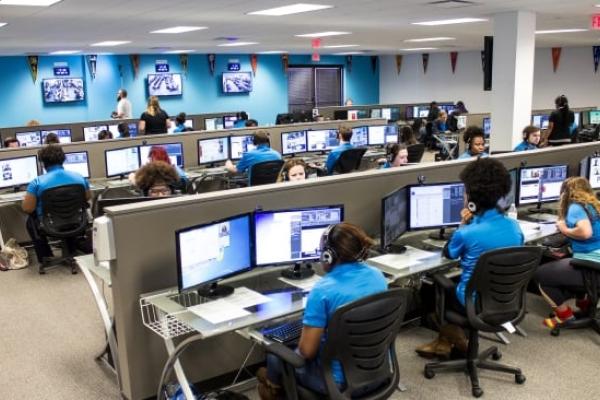Alternatives to Proctoring Exams in Online Classes

As online education continues to grow, institutions are exploring alternatives to proctored exams that uphold academic integrity while promoting meaningful learning experiences for students. The Office of Distance Education in the College of Arts and Sciences has been researching effective alternatives to traditional proctored exams. Instead of relying on surveillance-based testing, educators at different institutions have implemented various alternative assessments that encourage more critical thinking, creativity and ethical considerations. This article explains the main strategies we found.
Open-book and Take-home Exams
The first alternative to traditional proctoring is open-book and take-home tests. Open-book and take-home exams provide students with access to resources while measuring higher-order thinking skills rather than rote memorization. Instead of testing students on their ability to recall facts, these assessments encourage critical engagement with course material. Well-designed questions should require students to apply, evaluate, and synthesize information. For example, rather than asking, “What is X?” instructors can pose questions such as “How does concept X apply to Y?” “Which theory best explains Z? Why?” and “Propose a solution to problem X using the concepts learned in this course.”
To ensure the effectiveness of open-book assessments, instructors can avoid multiple-choice or true/false questions that measure low-level learning, opting instead for short-answer, essay, case study, or problem-solving formats. Using these types of assessments enable students to demonstrate their depth of learning while reducing the need for proctoring.
Frequent and Low-Stakes Assessments
Rather than relying on one or two high-stakes exams, frequent, low-stakes assessments can improve learning outcomes by reducing student anxiety and reinforcing material over time. Implementing weekly concept checks and short quizzes encourages continuous engagement. They also help students retain information by preventing last-minute cramming and reinforcing key concepts throughout the course. Instructors can also promote the use of multiple short exams rather than a single, high-stakes final exam. By spreading out assessments across the semester, students are encouraged to engage with the material consistently and formatively. This paced approach to assessment not only helps distribute student and instructor efforts but also reduces test anxiety and provides instructors with ongoing insight into student comprehension.
Non-traditional Assessments
Instructors can replace traditional exams with alternative assessments that allow students to demonstrate their knowledge through various creative and applied methods. Some of the most effective non-traditional assessments include:
Reflective and Integrative Prompts
Instructors can use prompts that encourage students to make connections between course concepts and real-world applications or personal experiences. These assessments foster deeper engagement and help students understand the relevance of their learning beyond the classroom.
Papers and Portfolio
Research papers and portfolios are a means for students to explore topics in depth and track their learning progression. Research papers allow students to develop arguments, analyze sources, and engage critically with subject matter, while portfolios provide a collection of work overtime, showcasing growth, reflection, and synthesis of knowledge. The Office of Technology and Digital Innovation at Ohio State provides instructors and students with access to PebblePad, a digital ePortfolio platform.
Problem-Based and Project-Based Learning
Students can engage in real-world problem-solving through problem-based and project-based learning. Instead of sitting for an exam, students work collaboratively or independently on extended projects that require them to address authentic challenges. For instance, a class in economics may ask students to analyze the impact of inflation on a specific industry and propose business adaptation strategies. This approach encourages students to develop critical thinking, problem-solving skills, and creativity while reinforcing practical applications of their knowledge.
For more information on how to build Scenario-Based Learning activities, please explore these ASC ODE articles:
- How to Build an Effective Scenario-Based Learning Activity
- Scenario Based Learning’s Potential for Online, Asynchronous Learning and Beyond
- Transitioning from Passive to Interactive Student Engagement Online
- ThingLink now integrated in Carmen for use by ASC instructors and students
- H5P: A Tool for Creating Interactive Course Content
Multimedia Assignments
Incorporating digital projects such as interactive presentations, blog posts, videos, or podcasts allows students to communicate their understanding in dynamic ways. These types of assignments can enhance student engagement and accommodate different learning styles. Multimedia projects encourage students to think critically about how to present information effectively while also developing digital literacy skills.
Online Assessment Strategies
Several online strategies can help ensure fairness in assessments without requiring proctoring. These strategies include:
Shuffling Answers and Randomizing Questions
These techniques are highly recommended by several institutions to prevent students from sharing answers easily. By randomizing question order and answer choices, instructors can discourage academic dishonesty while maintaining assessment integrity.
Using Large Question Banks
Developing large question banks from which assessments randomly draw questions is also recommended. This ensures that each student receives a unique set of questions, reducing the likelihood of answer sharing.
Time-Limited Assessments
To encourage independent work, time-limited assessments are useful. Setting reasonable but strict time limits ensures that students focus on demonstrating their understanding rather than searching for answers online.
Promoting Academic Integrity
Instead of relying on proctoring software, institutions can cultivate a culture of academic integrity by fostering ethical responsibility and trust among students. It is important to have clear communication regarding academic honesty. Providing explicit instructions, outlining expectations, and discussing the importance of integrity can deter dishonest behavior while reinforcing a commitment to ethical learning practices.
In conclusion, alternative assessment strategies provide effective and meaningful ways for instructors to evaluate student learning in online courses while reducing the reliance on proctoring. By integrating open-book and take-home exams, project-based learning, frequent low-stakes assessments, and reintroducing ethical responsibility, educators can enhance both engagement and academic integrity in virtual learning environments. As institutions continue to explore innovative assessment methods, these approaches will play a crucial role in shaping the future of online education.
Visit the following links for more resources and to discover strategies used by peer institutions:
- Delivering Online Assessments - Creating and Proctoring Quizzes and Exams, California State University, Long Beach
- Online Alternatives to In-Person Proctored Exams, Florida State University
- Academic Integrity Alternatives to Proctoring Software, Georgetown University
- Handling Exams When Your Course Unexpectedly Moves Online, Indiana University Bloomington
- Alternatives to Traditional Exams and Papers, Indiana University Bloomington
- What are some alternatives to proctoring?, Metropolitan State University of Denver
- Alternatives to Proctoring, Northern Arizona University
- Options for Delivering Exams via Virtual Instruction, Northern Illinois University options for delivering exams via virtual instruction
- Alternatives to Proctored Exams, Rutgers University
- Alternatives to Proctoring, The University of Memphis
- Non-Proctored Exams, The University of Iowa
- Best Practices - Remote Examinations, UC Berkeley
- Alternatives to Traditional Testing, UC Berkeley
- Alternative Assessment Options for Remote Instruction, Western Washington University

